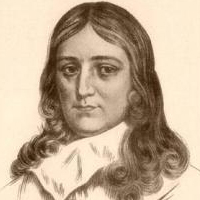John Milton - Biography and Works
John Milton was born in London on December 9, 1608, and educated at Saint Paul's School, Christ's College and University of Cambridge. He intended to become a clergyman in the Church of England, but growing dissatisfaction with the corruption in the Anglican clergy and the unseemly behavior of his clergy and the unseemly behavior of his colleagues in the Divinity college of Cambridge made him reconsider his decision to enter the church.

John Milton (1608-1674)
His own developing poetic interests also led him to abandon the church. Milton had been brought up in a God-fearing household where piety and duty were considered to be synonymous with good behavior. He looked upon his life and his career as a means to serve God and his country. From 1632 to 1638 he lived in his father’s country home in Horton, Buckinghamshire, preparing himself for his poetic career by entering upon an ambitious program of reading the Latin and Greek classics and ecclesiastical and political history. On his return to England after his tour of France and Italy, he settled in London and began writing a series of social, religious, and political tracts. In his writings, he supported the parliamentary cause in the civil war between Parliamentarians and Royalists, and in 1649 he was appointed foreign secretary by the government of the Commonwealth.
He became totally blind about 1652 and thereafter carried on his literary work helped by an assistant; with the aid also of the poet Andrew Marvell, he fulfilled his government duties until the restoration of Charles II in 1660. In 1656 he had married a second wife, who died two years later shortly after giving birth to a daughter who lived only a few months. With the Restoration, Milton was punished for his support of Parliament by a fine and a short term of imprisonment. He married a third time in 1663, and until his death on November 8, 1674, he lived in seclusion.
His work is marked by cosmic themes and lofty religious idealism; it reveals an astonishing breadth of learning and command of the Greek, Latin and Hebrew classics. Milton’s career as a writer may be divided into three periods. The first, from 1625 to 1640, was the period of such early works as the poems written while he was still at Cambridge, the ode “On the Morning of Christ’s Nativity” (1629), the sonnet “On Shakespeare” (1630), “L’Allegro” and “Il Penseroso” (both probably 1631), “On Time” (1632?), “At a Solemn Musick” (1632-1633?), The Masques Arcades (1632-1634?) and Comus (1637), and the elegy Lycidas (1638).
His second period, from 1640 to 1660, was devoted chiefly to the writing of the religious and political pamphlets that established him as the ablest pamphleteer of his time. In the first group of pamphlets, Milton attacked the institution of bishops and argued in favor of extending the spirit of the English Reformation. The first published of this group was “Of Reformation Touching Church Discipline in England” (1641). The second part of his devotion to social and political concerns yielded, among others, “Areopagitica” (1644), an impassioned plea for freedom of the press. The third group of pamphlets includes those Milton wrote to justify the execution of Charles I. One of these, “The Tenure of Kings and Magistrates” (1649), deals with constitutional questions and particularly with the rights of the people against tyrants. In the final group of tracts including “A Treatise of Civil Power in Ecclesiastical Causes” (1659), Milton gave practical suggestions for government reform and argued against a professional clergy and in favor of allowing people to interpret Scripture according to their own conscience.
During his year as a prose writer and government servant of Cromwell’s republican government, Milton composed part of his great epic poem Paradise Lost and 17 sonnets, among which are some of the most notable in the English language, including “On His Blindness” (1652?-1655) and “On His Deceased Wife” (1658). The third period extending the period of political success is also the apogee of Milton’s poetic career: this was reached during the period between 1660 and 1674, during which he completed his major works including the great epic Paradise Lost (1667) and composed the companion epic Paradise Regained (1671) and the poetic drams Samson Agonists (1671).
The greatest epic poet in the English literature, John Milton is also a visionary quester, a puritan protestant, a rebel against tyranny, an advocate of liberty and democracy, besides being a philosopher of many such religious and political ideas. He is the last Renaissance scholar and poet, A Christian humanist, a protestant patriot and an heir of classical Greece and Rome. An astonishingly well- read intellectual, Milton felt that England was experiencing the birth pangs of a new and regenerate era; he was excited that this country would lead the new world in every way, especially spiritually. He was a Puritan who thought that God hand chosen England as he had chosen Israel in antiquity; he even thought of himself as its chosen leader like Moses. His idealistic optimism took him to the extent of what we would now consider presumption, pride or intellectual arrogance. Since his college days, Milton has an ambition to become God’s chosen poet and spokes man by writing a religious epic that would “Justify the ways of God to men”, as he stated in The Paradise Lost as its theme. He saw his whole life as a preparation for that service to God. But one of the problems he faced was to blend the Christian with the classical (because of all its pagan elements). He began by keeping them separate and gradually replaced the classical with the Christian doctrines. Milton is often considered the greatest English poet after Shakespeare.
Cite this Page!
Sharma, Kedar N. "John Milton - Biography and Works." BachelorandMaster, 11 Nov. 2013, bachelorandmaster.com/biography/john-milton.html.
Related Topics
Paradise Lost: Summary and Analysis
On His Blindness: Summary and Analysis
Samson Agonistes: Summary and Analysis
 |
bachelorandmaster.com |